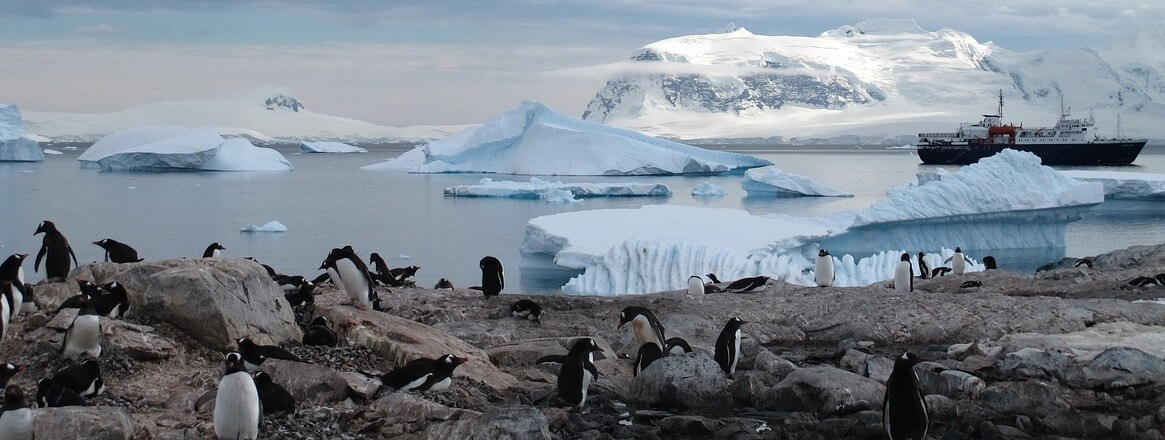The stories of the unknown adventure, camaraderie, hardship, sheer dogged determination, and often superhuman strength, of mind and body of the early Antarctic explorers such as Scott and Shackleton are amazing tales to this day. Some of the events make you groan with disbelief at the poor planning, or the unfortunate series of events; Scott died just a few days from safety, after being piped to the South Pole by the Norwegians (who extensively used dogs to pull the sledges) not least because he felt reliance on the use of dog sleds was not entirely sporting. Some are immensely inspiring stories of great success from overt failure; Shackleton got stuck in the ice, lost the ship, managed to survive for over a year, and then crossed the dangerous Southern Ocean in an open wooden lifeboat, and yet, brought every one of his team members back alive. These exploits, along with the magical, mythical images of events like the aurora australis, the beautiful emperor penguins and the entirely alien landscapes have always completely fascinated me.
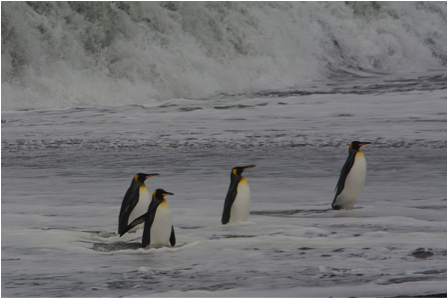
King penguins emerging from sea
I saw the job advert for a doctor in Antarctica a few years before I applied. At that time, I was not experienced, or more to the point, confident enough to take the role, but the desire to spend time in, and explore the rugged and strange environment stuck with me. So when I saw the advert again on the BMJ website in autumn 2013, I knew that it was the right time to apply. There were four posts available at this intake.
My friends are fairly evenly split between those who are in a state of complete jealousy about my adventure and those who can’t think of anything worse. For those in the latter group, thoughts of being away for such a prolonged period, spending nearly three months on a ship on the open ocean and a year on an isolated island with a “select” group of (potentially mad) scientists, techies and other support staff, where half the year is spent under snow and without any of the usual luxuries (like non-powdered milk) horrify them.
My family, mostly were in the “why on earth would you want to do that?” camp, but after the initial shock of telling them what I was planning to do, they came around to the idea and have been at least a little taken with the adventure too.
British Antarctic Survey (BAS) operates four year-round bases on Antarctica and in the Sub-Antarctic; three of which have a British Antarctic Survey Medical Unit (BASMU) doctor (Halley, Rothera and King Edward Point). Additionally, there are three other, summer only bases, none of which have permanent medical staff, but are covered by advanced first aiders under remote guidance from the three base doctors. BAS also currently operates two research vessels; RRS James Clark Ross and RRS Ernest Shackleton (soon to be replaced by RRS David Attenborough AKA Boaty McBoatface), which have doctors onboard when operating in Antarctic waters. BASMU doctors work independently while deployed south, but as BASMU is based in Derriford ED, there is always advice available by phone when needed.
In May 2014, along with three other very excited doctors, I started working for BASMU. I spent the first few months at BASMU’s base in Plymouth learning a host of new medical skills, such as how to fill and pull teeth, how to run a dive chamber (Rothera has a scientific diving programme, and therefore a chamber on site), basic theories of physiotherapy, and taking and developing xrays, amongst many other clinical topics usually outside of my remit in the ED. During that time, I also took some non clinical, but rather fun “work” courses, including powerboating and sea survival. Much of our time in Plymouth was left to our own discretion to direct our learning as we felt necessary, giving us opportunity to fill in areas we were not so au fait with. We also spent some of this pre-deployment time doing medical screening for BAS staff travelling south, attempting to mitigate against medically higher risk deployments.
In the middle of September 2014, I drove up to Immingham to meet the ship that I was to spend nearly three months sailing to King Edward Point (KEP) on the island of South Georgia on the Royal Research Ship James Clark Ross (RRS JCR). While on board, I was the ship’s doctor to the crew and the scientists on board. I learned about life at sea, ships navigation, about CTDs (conductivity, temperature and depth water measurements), how to bake bread, as well as taking part in ships drills, including some of the more unexpected drills, such as watertight doors, piracy and stowaways.
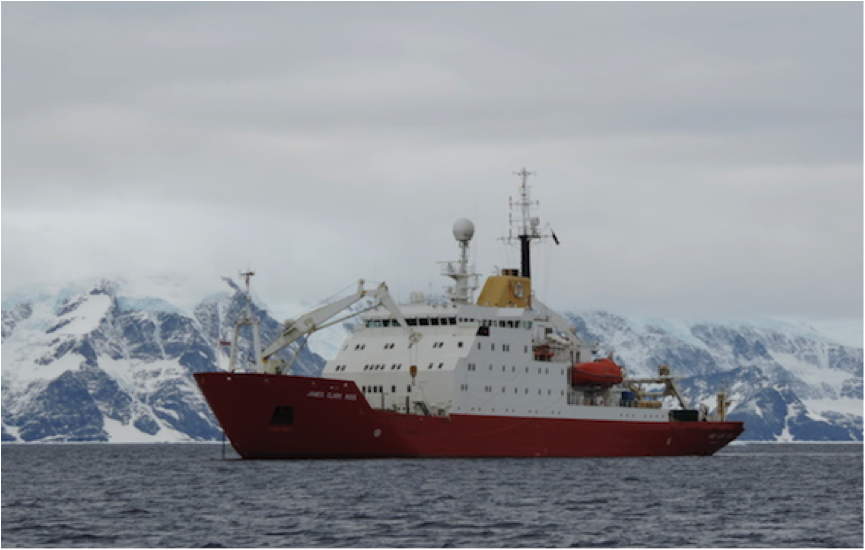
RRS James Clark Ross
When we crossed the equator, all the pollywogs (sailors who have not yet crossed the equator) were enrolled in an age-old game of “crossing the line”. This entailed the pollywogs hiding or defending themselves, and those who had, trying to recapture them and bring them before King Neptune, who would hear the pollywogs’ “sins”, which would be absolved by King Neptune, after appropriate punishment and kissing of the kipper. This actually was far more fun than it sounds!
As well as running science, the ship has a duel function of logistics, and is the means of annual resupply of goods and staff for a number of the British Antarctic Survey bases. Everything needed on the bases (for example cooking utensils, food, fuel, toiletries, camping gear, boating materials, science equipment, stationary and communications items) must be ordered in advance and is delivered once a year. Waste is packaged and removed for recycling. On the way south, the hold was packed to bursting with snowcats, diggers, food, building materials and all the other sundries required for the bases for the following year.

Sea ice approaching Signy Base
After nearly three months on the ship, I arrived at KEP on 4th December 2014, while the then current doctor and I had a brief handover of the medical services, the rest of the team started the mammoth job of unloading, checking off and putting away of a years worth of gear. That evening, RRS JCR sailed, taking last years doctor and leaving me on the jetty with my new friends and colleagues (who had arrived a few weeks before on the South Georgia Fisheries Patrol Vessel the MV Pharos). The following year has been an absolutely amazing experience. This is in no small part related to the group of people I spent the year with, the beautiful scenery and amazing wildlife.
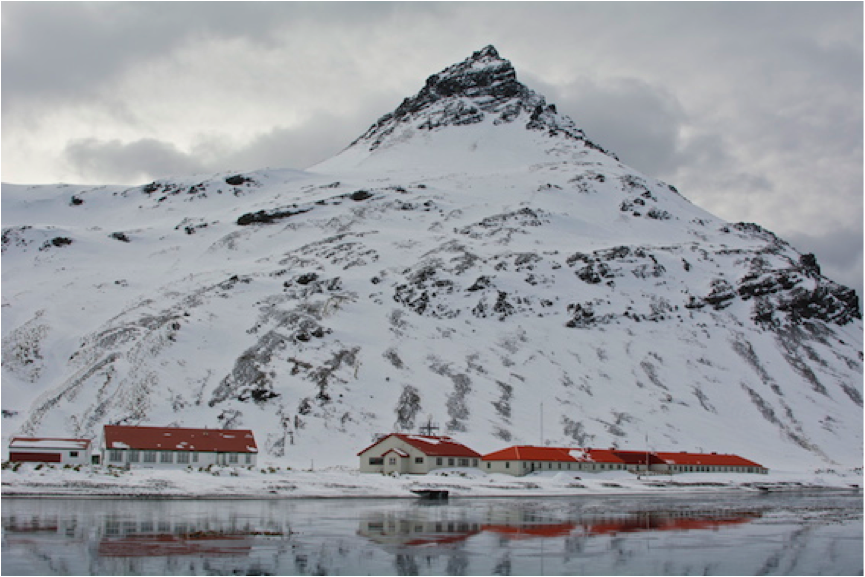
The BAS base at King Edward Point, South Georgia
The core BAS team included a fisheries scientist, a bird / predator scientist, an electrician, a mechanic, two boaties, a station manager and a doctor. The average age was around forty, there were two girls.
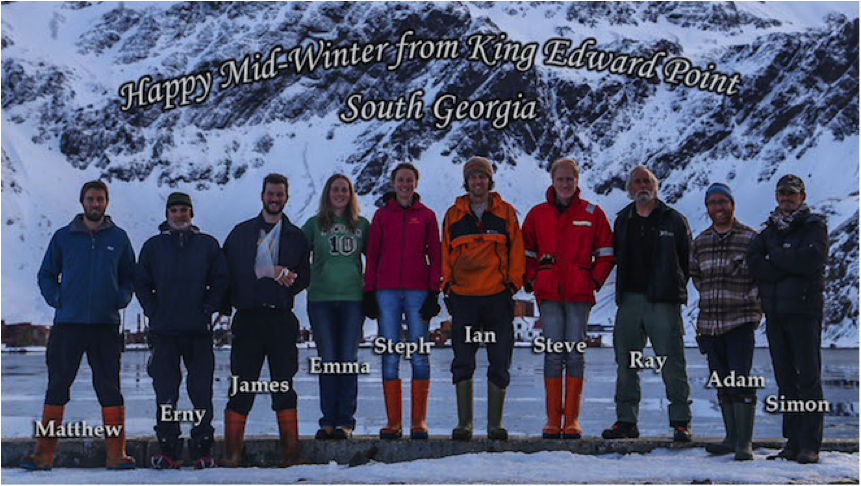
The 2015 wintering team
I spent a year at King Edward Point (KEP) and was the sole medic for the BAS base, and the South Georgia and South Sandwich Island Government (SGSSI) staff and the South Georgia Heritage Trust (SGHT) staff. The population varied between seven people in the winter and up to fifty-four at the very peak of the summer season. The island also sees a number of cruise ships and private yachts over the summer period and fishing vessels over the winter period, and although we do not have responsibility for their medical care (they must be medically independent), due to the remote environment, we will often be asked for emergency assistance for those vessels.
I also had remote care of the staff at the year-round base at Bird Island (BI) and the summer only base of Signy. The two bases added a population of between four in the winter, and eighteen in the summer. This added an interesting dynamic to care; the staff at these bases are trained to a high level of first aid, but are essentially non medical personnel, you can not examine them and they require precise direction on management of problems.
Bird Island was only approximately sixty miles away as the crow flies from KEP, however, due to the terrain (glaciers and mountain ranges) and sea conditions on the island, it was out of both our land and sea travel limits.
Part of my remit while at KEP was ongoing training for the first aiders, including those at Signy and Bird Island. I tried to ensure varied sessions, covering topics from assessment, treatment, packaging and transporting of patients for the team at KEP. Signy and Bird Island requested material driven by their specific needs. I had a vested interest in this training; if I were to have had an accident or illness, the nearest medical facility was four or five days away in the Falkland Islands, if there was a ship at KEP ready to return to Stanley at that point. At worst evacuation to the Falkland Islands could be ten to fourteen days away.
I was relatively lucky that in my time at KEP, there were little by way of significant medical problems within the base team itself. This gave me opportunity to take a number of the modules of Plymouth University’s Diploma in Remote Healthcare, and tried when the internet allowed to listen to podcasts and to do some e-learning sessions to maintain my knowledge.
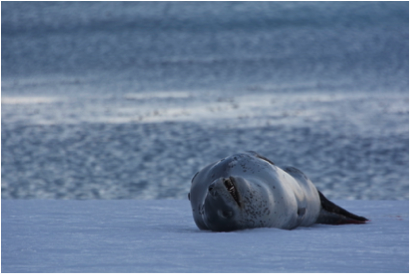
Leopard seal
All BAS members of the base were on a rota to cook, clean, do base checks and to do household chores. I learned some amazing cooking skills during my time south, particularly curry from scratch, baking bread, and fantastically creative use of food supplies that you would never contemplate using unless you have lived on a single annual food supply! Each Saturday we cooked a three-course meal for all of the people on base. One of my early ones was for twenty-seven people, of which one was veggie, one celiac, one lactose-intolerant and another had nut anaphylaxis. Throwing a dinner party in the future is going to be an absolute cinch!
When I was not doing medical or general rota work, I had a number of other regular roles, including assisting the post officer, managing food supplies, and inventorying kit on base for the following years order. One of the very high responsibility jobs of the doctor was to share out the chocolate and crisps on a monthly basis. We had on average a chocolate bar and a bag of crisps per person a week.
We also have a number of boats on the base, and the boating officers trained me up so that I could radio follow, crew and cox the ribs and jet boats, which was one of my favourite work tasks, even on the days when the sea froze immediately to your visor, it was great fun to be outside surrounded by the rugged bays of this beautiful island.
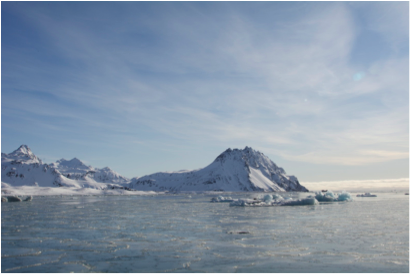
Cumberland bay frozen over
The main purpose of the base is science, and for such a small population of scientists there is a rather large host of projects underway. I learned a lot about a huge variety of specialities from weather wave patterns (weather balloon data) that contribute to weather modelling programmes; to monitoring and management of sustainable krill, icefish and toothfish fisheries; to gentoo penguin, fur seal and giant petrel monitoring amongst many other topics. One of the most prominent issues I have taken home with me is the very real issue of global warming, which is uncomfortably apparent when looking at the island’s rapidly retreating glaciers and the yawning discrepancy between the current glacial faces and the historic tide marks. It should not take a trip to Antarctica to reaffirm this in my mind, but the imagery is much more harrowing in this otherwise untouched landscape than you might imagine.
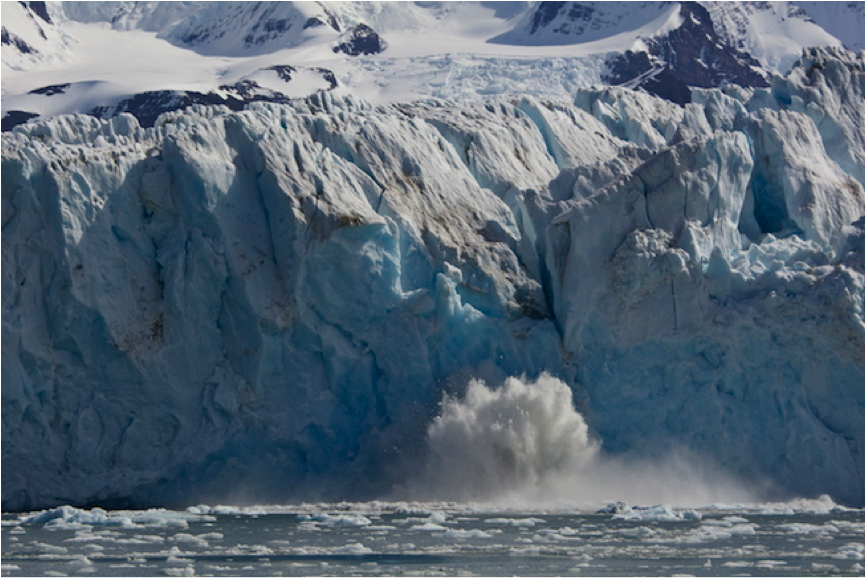
Glacier calving
The year passed by far to quickly, and before I knew it, our replacements had arrived, and it was time to leave. On 6th December 2015, after just over a year on South Georgia, five of the wintering team boarded the MV Pharos, and waved goodbye to our friends, colleagues and our beautiful home for the season.
Medical Exam Prep would like to thank Dr Emma Browne for contributing this blog post
About Dr Emma Browne
Dr. Emma Browne graduated from the Royal College of Surgeons of Ireland in 2006. She is an ST6 in Emergency Medicine in KSS deanery, and has diplomas in Immediate Medical Care and Sports and Exercise Medicine and has WEMSI Wilderness Physician certification. She has worked in Ireland, Australia and England. She enjoys wild camping, hiking and cycling (all at a generally leisurely pace!).

